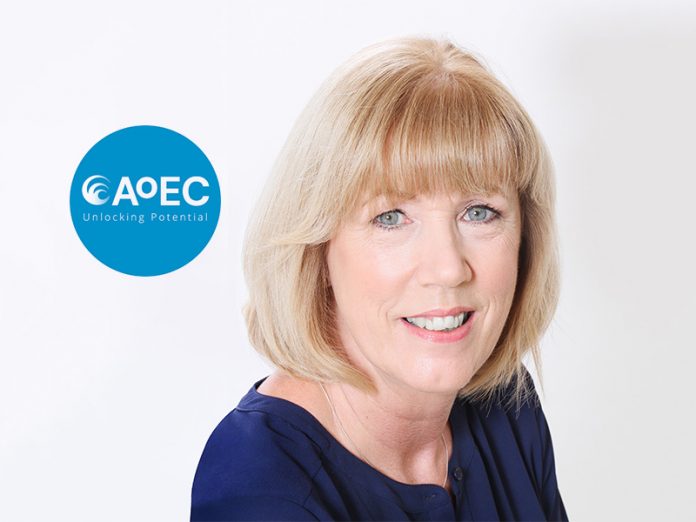Interview with Gina Lodge, CEO of The Academy of Executive Coaching (AoEC)
Nobody knows for certain what the post-COVID business world will look like and exactly what challenges await business leaders. Gina Lodge, CEO of the Academy of Executive Coaching (AoEC), believes that the human traits of compassion, transparency and self-awareness are among the key characteristics that leaders will need to display as they confront the future that lies ahead.
There is an old saying that “there is nothing new under the sun”. Do you think that business managers are facing something fundamentally new in the post-COVID world, or can they tackle it using tried and tested approaches?
The pandemic shows that there are challenges out there that we have not thought about when we have been putting together long-term strategies. There has been a human cost, a financial cost, and a cost to how we live our lives and do business. We have seen in real terms just how vulnerable we are as humans to the disease and just how compromised our organisations can be structurally and financially. It has also highlighted how we have become ethically fragile, with more value placed on economic success rather than on the things we should truly value such as health, integrity and equality.
When you look at the future of work, we have been handed this unprecedented opportunity to rediscover what good leadership and management should be. That is, to provide a positive and collaborative force for change where our managers and leaders are in service of their people, with organisations in service of their community and wider society.
We have all been impacted by coronavirus and it has shown us that we must work together to get through crises like this. Change has been huge, fast and deep and we are not yet out the other side. We are going to have to rely on faith, the tried and tested, and not be afraid to try new things out. It has exposed gaps where people don’t know what to do or how to go about it. If we are too scared to take risks or admit to not having the answers, then we will not be able to minimise the pandemic’s scarring effect. We need to work on our individual and organisational resilience. That means being prepared in the event of change, because you have developed the capacity and capability to work with the unknown, regardless of what might be going on around you.
What leadership characteristics do you see as being the most needed in the future?
I would pick out three that are all very linked to being more human in how we are in the workplace.
Compassion is important, because it is such an intrinsic part of emotional intelligence and crucial in forging meaningful connections. The pandemic has exposed our fragility when it comes to our physical and mental health and, at the same time, offered a peek into our colleagues’ personal worlds, reminding us all that we are human, all have families and a life beyond work. We must be more at ease showing care and empathy if we are to get through this together.
The second is transparency. The best leaders are those who show their vulnerability and take their people on the journey with them by being open and honest, and by communicating what they are doing. We can’t truly plan for the long term without accepting that there will be some short-term intensity along the way.
Self-awareness is another top priority. How do you show up as a leader, as a coach or as a manager? The better you understand yourself, the more effective you are for others. It is pivotal in allowing you to learn from past experiences to know where your strengths and weakness lie and how you can be of true service when it matters the most to the people who work alongside you.
You have spoken elsewhere about the need to reconstruct our very idea of leadership and focus on qualities and attributes that allow us to harness change, maximise opportunities and succeed in turning challenges into possibilities. Could you enlarge on that theme? And how can we be sure that, in adapting our processes to accommodate change, we don’t lose management skills that could still be of value?
We’re in a new era where it is purpose, not profit, that drives organisations forward and that is partnered with a shift from shareholder capitalism to stakeholder capitalism. That brings a fresh demand on leaders to demonstrate a new willingness to listen, to celebrate diversity of thought and to do and say the right thing to effect change for their organisation and society at large.
To achieve that, leaders need to humanise their approach, put their soft skills to work, be inclusive and adopt a mindset that embraces disruption. That means showing empathy, being compassionate, properly communicating with other people by really listening, welcoming feedback, and reflecting and collaborating with others inside and outside of the business. It is also about being a conscious leader and having the courage to work with the unknown to enable others to feel safe.
Command and control as a leadership style is outdated when it comes to today’s evolving needs. The pandemic has reordered the work/life priorities for many, and leaders are learning that they can still get the most out of people when they take a softer approach, such as a coaching style. It is not about losing the skills that are of value, such as problem solving or decision making, but about sharing the load and finding new, better ways of building alignment, being more agile and ensuring productivity and performance increase without having to rely on hierarchical power.
What, in your view, are the principal benefits that coaching skills have to offer in the post-COVID environment?
It is well known that skills gaps generally exist, but COVID has laid bare the areas where critical skills are lacking throughout organisations. The pandemic is a huge factor, but it goes wider and deeper, with not just technical skills that are missing, but leadership and general employability skills, too.
Work is becoming ever more complex, technology is making some jobs obsolete, teams within companies can be siloed and disconnected from the wider organisation, systems become outdated and work can lack meaning and purpose. These are all deep-rooted causes for concern, and it is essential that we recognise where these gaps are and encourage a culture of continuous learning, so we can emerge stronger from this and future crises.
Coaching skills have a big role to play as part of the economic recovery, because they underpin so much of what is an organisation’s lifeblood. First and foremost, coaching skills can help achieve better outcomes, because they prepare employees to be ready for change, to work on blind spots and to be able to adapt to work through challenges. It promotes flexibility and makes problem-solving easier. It helps unlock potential, which brings new thinking, innovation, and the courage to experiment with new ideas.
With reference to executive coaching, would you say that the coaching handbook will need to be completely rewritten in light of the “new normal”?
I disagree that it needs to be rewritten, but tweaked here and there, yes.
I think there are probably two main areas where coaches are going to have to widen their expertise so they can better support their colleagues or clients. The first is in building the organisation’s resilience and that of its people. It goes without saying that organisations need to be more financially and structurally resilient, but they must also strategically invest in giving their employees the tools to cope with the unseen. This falls outside of well-being initiatives and uses resilience coaching to build the capacity to deal with change, to work with risk and be capable of dealing with whatever life throws at you in healthy and effective ways.
The second is having a systemic perspective in your work. It is understanding the bigger forces at play which have a direct or indirect impact on your business and employees. With the shift to stakeholder capitalism, this is going to be one of the mainstays of coaching work and central to the ever-growing complexities we face. It also aligns with the fact that coaching must deliver value beyond the individual. The appetite for team coaching is steadily growing, but a systemic coaching approach goes much further by bringing in the stakeholders’ needs, makes sense of the opportunities that lie behind perceived threats to our business and helps deliver greater meaning to our work and the communities we serve.
How can coaching help leaders to think differently and approach challenges in new ways?
Coaching in the workplace is all about facilitating learning and results. It is a key tool for supporting personal development so it can be used for learning new skills, to break patterns or habits and to promote different behavioural responses to familiar situations. It serves to construct knowledge where the coachee, in this case a leader, is helped to discover knowledge for themselves and to think and act beyond their current level of competence.
It can open the door to new possibilities, ways of thinking and ways of being. Coaching helps the leader stand back from the everyday demands of the business and look at what is going on within the company and the wider system and at how they and other people within the organisation are learning and applying that to benefit the business overall.
What do you see as the benefits that a coaching culture offers for the future, as opposed to a culture of “command and control”?
A coaching culture is much more democratic. It promotes the idea of continuous learning and is very much geared around values, purpose and empowering the workforce. With command and control, there can be a culture of dominance, leaders are detached, productivity is lower, and employees can feel undervalued and isolated.
With coaching, motivation is higher, because employees have autonomy in how they deliver their work, meaning job satisfaction increases. Collaboration is the natural order, with colleagues looking for opportunities to help others. Team members strive for high performance. With the absence of a blame culture, psychological safety and trust are stronger, as employees are encouraged to experiment and try out new ideas. For organisations, that means that there is better talent retention, reduced absenteeism, good governance, widespread innovation, sustainable growth, and a healthy financial performance.
Even prior to the pandemic, the modern age was frequently characterised as being one of constant change. In the post-pandemic world, would you say that approaches to change management will need to be revised in order the cope with new kinds of change?
Yes, I do think a there is a need to modify our approach to the way change is handled. Five-year strategies are not enough to see off the challenges we face further down the line.
The long-term view is still a top priority, but we must be ready for shorter periods of intense disruption. You cannot survive in the long run if you don’t deal with the short-term. That means being aware of what is going on outside of the business and investing in making your employees change-ready.
The International Coaching Federation (ICF) and Human Capital Institute did some research into change management towards the end of 2018 and found that high-performing organisations have more successful change management capabilities in place and that those who had a strong coaching culture were more likely to have better business outcomes. Coaching plays an important role in risk and change management, because it helps tackle resistance and improves communication, so people have a better understanding of why something is happening and what is required from them. If you use resilience coaching, too, you are building capacity and enabling workers to have the capability to work with unseen and sudden shocks. Having strategic and sequenced investment in coaching and skills training will help minimise the damaging effect of crises like the COVID pandemic.
You’ve spoken about the necessity for managers to do more to relate to their direct reports, who may be facing an unsettling time. What general principles and criteria can managers apply to their efforts in this regard?
It is all about showing your human side. Taking the time to check in with your colleagues and asking them how they are doing has a huge impact on well-being and the feeling of belonging.
I think we have probably got better at showing sensitivity and care because of the pandemic, but we cannot go backwards when it comes to building relationships with the people we work with. It is investing time in listening to what is going on for our people, sharing their worries and hopes, just being there and having trust.
Good, clear communication crystallises clarity when it comes to making your people feel like they matter and to know what is expected of them. Management should be situational and contextual but it also needs to be inclusive and bring your workers into what is happening within the wider organisation. It is about making yourself available, so they know they are supported to do their jobs to the best of their ability. That could be a daily check-in or a weekly catch-up. Just saying hello and having a chat is simple but empowering.
We also need to be flexible. With everyone working from home, there are other priorities to juggle, such as home schooling or care for other dependents. Giving employees the freedom to work around such commitments is important, because it takes some of the pressure off and shows you trust them to do their job without the need for chasing.
Aside from that, I think it is important to say that managers and leaders are here to serve their direct reports. Your mindset should be “What can I do for you that will help you be successful?” There must be that belief in your people that they can grow and stretch and that you can help them achieve their potential, because that contributes so much to your own success.
Remote working is very much to the fore these days, a situation that is certain to continue as we go forward. What are the challenges here for organisations implementing a coaching culture, and how can they be addressed?
We have been virtual since being founded in 1999 and one lesson that can be overlooked is ensuring that you equip your people with the right technology needed to get the job done properly. Having substandard systems can impact culture, so invest in the tools to keep employees motivated and engaged.
I don’t believe that, just because you are not in the same place at the same time, your relationships or communication are any the poorer for it. Having good, regular communication is vital, as is the bigger need of truly empowering your people to do the job, irrespective of where they may be. The challenge is to show that you trust your workers and that you have the faith the work will be done.
Culture comes from the way you work together and the purpose and meaning your work represents. Trusting your team and allowing them to experiment with ideas or new ways of working nurtures engagement, a sense of belonging and the psychological safety that is so crucial to success outcomes.
If you operate with an autocratic style of leadership and are quick to judge or don’t keep your employees involved with what and why things are happening at the strategic level, you will find it impossible to implement a coaching culture. Those working like that, regardless of being in one office or all working from home, will find that they are creating an environment of fear and blame where people feel disconnected from their work, their colleagues, the company, and its leadership.
Remote working is an obvious practical dimension of the new normal. But do you see it as a key factor in the future or are there others, such as the ability of managers to pivot to deal with unfamiliar challenges, that could be more significant?
Hybrid working is here to stay and can offer businesses the best of both worlds. The old way of doing things is no longer a realistic option. In truth, it does not matter where your staff are based while they are doing their work. What really counts, though, is that they have access to good, strong leadership and management. That is truly transformational when it comes to how well people and, ultimately, the business perform.
There are far too many accidental managers in post who have got there because they have been good at the job they were hired to do. With management positions come a whole new set of responsibilities and accountability. We must invest in better management and leadership training, so our managers have the professional competencies needed to lead people properly and can work with complex change.
Technology in the form of remote working is obviously playing an enhanced role in coping with the consequences of the pandemic. We’re also hearing a lot about AI. What do you see as the principal benefits, as well as challenges, resulting from the application of technology in business of the future, and what part can the development of coaching skills play?
I think technology makes everything more efficient and accessible to everyone. It takes the monotony and repetition out of a lot of job functions, but it cannot replace the one thing humans are good at, and that is questioning, creative thinking, innovation.
Technology is a force for good, and if you think about how we use it in our personal lives, it can offer a lot of joy. It should enhance what we do in the working environment, not add to the burden.
Where coaching and AI meet is still a grey area but there are now programmes available that use artificial intelligence to support coaching people. This can offer technology that works hand in hand with the human interaction of coaching. At this point in time, we envisage an outcome where AI complements the coach, rather than replaces them. There may be applications where AI can offer a practical solution where you have lots of people you want to benefit from coaching, in terms of being scalable and maybe more cost-effective. At present, it is believed the human coach will always provide a deeper, richer and personalised experience, because they are seeing what the machine can’t. Coaches or managers as coach may, in the long term, have to learn to collaborate with AI.
You’re an advocate of putting humanity back into business processes, and you’ve also spoken about the need for managers to display curiosity, kindness and respect. Could you enlarge on that theme? Do you see it as having any special relevance to the post-COVID environment?
Those are all very personal qualities to me and are the values by which I try to lead my own team. By being curious, I mean seeking out diverse thoughts. There is so much to be gained by listening to and speaking to other people. To find out what has worked for them, why they might do something a particular way, what their experiences in life and work have taught them. We can learn so much by sharing knowledge and it can add immense value to your organisation.
I think we can sometimes be guilty of not being kind to one another by being caught up in our own problems and demands. Kindness reduces the distance between people and makes for better relationships. In the workplace, that translates into happier employees who have better engagement, higher morale and who are more connected and resilient.
We should all be demonstrating respect, because it is reciprocal and underpins trust and psychological safety. Other people’s opinions really do matter, and it is a core ingredient in helping teams to perform effectively. It reduces stress, conflict and problems. As leaders and managers, we must treat our staff fairly, equally and well.
A recent report by the Chartered Management Institute highlighted the need to learn from managing in the early stages of the pandemic, and evaluate what has worked and what new ways of working we need to embed in the new working world. Do you agree with this view and, if so, what criteria do you think need to be applied in the course of this evaluation?
I do agree with this, and the CMI’s report offers a lot of valuable advice to put into practice. If we don’t learn from our experiences, then we cannot grow or improve.
If you also look at it in the context of most change management initiatives failing, then things must be done differently. Do we want to be stuck with a roadmap back to yesterday or take the opportunity to embrace a new management and leadership ideology that offers a more secure and better future?
We can’t afford to make mistakes and then not look back and try to understand why something went wrong or didn’t work.
In the first instance, managers and leaders need training in the competencies they need to do that job properly. At the same time, we need that shift in mindset and ideology to happen, so that we set the tone for good practices, more flexibility and make our workplaces more open, honest and inclusive.
We must be attentive to well-being, resilience, productivity levels, how well we are innovating and how we are adding value. Monitoring and evaluating these aspects will provide a good insight into how the organisation is performing and meeting its stakeholders’ needs. This can be actioned by having regular conversations with your people, inviting feedback, and cultivating the space where it is acceptable to admit to mistakes and where learning is shared. It is OK for managers and leaders not to have all the answers, but they need to be honest in admitting that to their employees, and use clear communication to explain what is happening and expected of their people.
The research also indicated that organisations that have fostered a sense of belonging and made efforts to bring their people together during the pandemic have experienced benefits to their culture. Could you comment on that?
This comes down to trust, empathy, good communication, transparency and inclusion. It is about investing in those personal connections and demonstrating that you care about the people you work alongside and that you are keeping an eye out for those who might be struggling. Employees need to be more visible within the bigger system, so consult and involve them and don’t give in to the temptation to micromanage them. Give them a voice where they can ask about the things that may be worrying them, bring ideas on how to improve things or even just offer help if it is needed elsewhere in the business.
It is also being mindful of the many differing needs of the people who work within your organisation and making sure that the employee experience is positive and aligned to their personal needs. That could be around offering flexible working that suits care-givers or parents having to work and home-school at the same time. Importantly, it also links to purpose and meaning. People want to know they are doing something for the greater good. At the same time, we should be recognising hard work and celebrating successes, no matter how small.
If we get all these aspects right, then you are going to have an engaged, motivated, productive and happier workforce. Morale is higher. They feel valued. They feel part of something that matters. That can only be a win-win situation for everyone.
The economic environment is certain to be tough in the post-COVID world. What would you say to organisations that are considering their ability to budget for training in coaching skills in this context?
Without learning or access to developmental opportunities, there is only one outcome for organisations, and that is the decline of your business. It is a responsibility that falls on all our shoulders. We must continue to invest in education and skills development, because it is the vital spark of any organisation that wants to be successful, agile and prosperous.
The obligation is to see learning and development as an investment, not a cost. Many reputable employers place a high priority on training but, where budgets are being slashed, it is an area that businesses should be ring-fencing for ongoing funding and resourcing.
We are living in a time where jobs are going to change every few years, along with the skill set needed to do them. We have endured a skills crisis for far too many years, and it is time for businesses to change their approach to training and recruitment. We should be hiring talent based on their skills, and investing inwards so that we are making full use of the potential we already have within the talent pool that works for us. Yes, it is a high resource, but the return is even higher.
Executive Profile
Gina Lodge has over 20 years experience in management roles while employed by Shell International Chemical Co. Ltd and subsequently in IT and Education. During her career she gained significant experience in project and change management. Gina was directly involved in implementing Quality Management standards, Business Process Re-engineering projects, and IT applications. Gina managed a department of 25 handling the supply chain logistics for Shell Chemicals International Trading Co. Ltd, where she gained a detailed knowledge of International import and export procedures. The role included liaison and troubleshooting with global service companies. Gina joined the AoEC in 2008, became Marketing Director and Board member in 2010 and in 2015 was appointed CEO. She is an accredited Executive Coach and a graduate of the AoEC. Gina also sits on Editorial Board for Coaching at Work magazine and the Advisory Editorial Board of The Open University Press (Coaching Section).







































